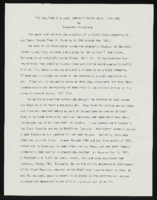Search the Special Collections and Archives Portal
Search Results

Interview with Marcell Eugene Bridges, June 12, 2004
Date
Archival Collection
Description
Text

Interview with Zenna Mae (Schmid) Bridges, June 12, 2004
Date
Archival Collection
Description
Text

Transcript of interview with Jack W. Zunino by Stefani Evans and Claytee White, August 30, 2016
Date
Archival Collection
Description
Landscape architect Jack W. Zunino is a Fellow of the American Society of Landscape Architects (ASLA) and president of the Society's local chapter. He has designed many of Southern Nevada's iconic landscapes: the Rio Hotel, the M Resort, the Desert Demonstration Gardens, the gardens at Ethel M. Chocolates, the Cactus Avenue overpass, and most notably, the Springs Preserve. He's also a third-generation Nevadan from Elko, grandson of Italian immigrants who met and married in the Silver State and raised their large family in that Nevada mining town. The product of Elko schools, he graduated from the University of Utah in psychology and Utah State University in landscape architecture while earning his tuition as a road construction laborer. In this interview, Zunino tells of his employment with G.C. Wallace Engineering and JMA architects before founding his own landscape architecture firm in 1989. He speaks to the importance of planners and landscape architects on Southern Nevada's conser
Text

"The Evolution of a Black Community in Las Vegas: 1905-1940": manuscript draft by Roosevelt Fitzgerald
Date
Archival Collection
Description
From the Roosevelt Fitzgerald Professional Papers (MS-01082) -- Unpublished manuscripts file.
Text

Transcript of interview with Liliam Lujan Hickey by Layne Karafantis, March 18, 2010, & March 25, 2010
Date
Archival Collection
Description
Liliam Lujan Hickey is best known in the state of Nevada for being the first Hispanic woman elected to the State Board of Education as well as for the enormous contributions she made while serving from 1998 to 2000. For this, an elementary school in Clark County bears her name. Despite many obstacles, Liliam has continually dedicated herself to standing up for the causes she believes in, such as providing preschool education to the underprivileged, preparing youth to enter the workforce, helping other Hispanics run for office, and proving that with enough courage anyone can accomplish their dreams. Born in Havana, Cuba in 1932, Liliam led a sheltered life that revolved mostly around her studies at a French Dominican school. She met her first husband, Enrique Lujan, when she was only sixteen and they wed soon after. Enrique was twelve years her senior, owned many casinos on the island, and provided a luxurious existence for Liliam and their three children. However, this lifestyle abruptly changed when Castro assumed power in 1959 and Liliam and her family were compelled to relocate to the United States. In Miami, Enrique assisted other refugees financially, hoping that his wealth would remain secure in Cuba. He was wrong. This left the family destitute. In addition to casinos, Enrique had been Cuba?s coach for the Olympics. He moved the family to York, Pennsylvania, where he hoped to find work at the York Barbell Company. Liliam, who had been accustomed to having maids and nannies in Cuba, found herself doing all the housework while she also worked in a factory. The change could not have been more dramatic and the living conditions became unbearable. The family chose to move to San Diego in a Volkswagen Minivan with the hope for a better life. The next few years brought many transitions. Things did turn around in San Diego, and Liliam she recalls her years in southern California as some of the happiest of her life. Liliam found a job working at the Scripps Clinic in La Jolla. After a few years, Enrique found a job in Las Vegas and the family moved again. In Las Vegas, Liliam gave birth to her fourth child, Mary, and life once again became financially difficult for the family. In 1972, the situation grew worse with Enrique?s untimely death. Liliam was a widow at forty years of age. She had to teach herself how to drive a car, write checks, and perform financial tasks that Enrique had insisted on managing while he was alive. Determined not to give up, however, she worked tirelessly to keep the family together. Amidst all this, a friend introduced Liliam to Tom Hickey, and after a brief courtship they were married in 1981. Within a few years, Liliam became active in politics, running for the State Board of Education. Her campaign manager advised her that voters would not be receptive to photos of a Hispanic woman on billboards, and to capitalize on the name “Hickey,” which was a recognizable name because her husband was an assemblyman. She took the manager?s advice and was elected in that campaign and for two more terms, the maximum limit for the office. After the first race, she proudly displayed her face on billboards across the state. During her time at the State Board of Education, Liliam dedicated herself to helping all children receive a better education in Nevada, not only Hispanics. She co-founded the Classroom on Wheels [COW] program, which brought buses to poor neighborhoods to provide pre-school education. She established Career Day, which pairs high schools students with business professionals in an effort to help them make the transition into the workforce. While the COW program is no longer running, 8 Career Day still operates and awards scholarships in Liliam?s name annually, which helps youth receive the educational opportunities they need to succeed. And she involved Hispanic youth in Boy Scouts by bringing ScoutReach to the Las Vegas valley. Lujan Hickey worked in a wide array of other community organizations. In the 1970s, she began to work with Circulo Cubano, which later became the Latin Chamber of Commerce, and she would later belong to the National Chamber of Commerce. A longstanding member of the League of Women Voters, Liliam saw the need to get Hispanics more involved in politics in the state. Her story is one of great inspiration, and when asked why she does it, she simply replies with a smile, “I love life.” Hickey?s narrative offers the reader a glimpse of the experiences of the Cuban refugee experience in the U.S. in general. Specific to Las Vegas, it provides a rare story of the experiences of early Latinas in the political and economic development of Las Vegas in the last half of the twentieth century.
Text

Transcript of interview with Jarmilla McMillan-Arnold by Claytee D. White, October 7, 2010
Date
Archival Collection
Description
Jarmilla McMillan-Arnold’s father, Dr. James B. McMillan, was the first black dentist in the state of Nevada. Dr. McMillan’s colleagues consisted of Dr. West, the first black medical doctor in the state, and Dr. Ice, the first black surgeon in Nevada. This interview highlights and archives the solid foundation upon which Nevada’s black community was built. Jarmilla recalls early memories of growing up as the daughter of Las Vegas NAACP president Dr. McMillan. She was born in Detroit, Michigan, to a Caucasian and Indian mother who was a professional dancer. Jarmilla’s parents separated when she was very young and as a result she was raised by her paternal grandmother who owned a restaurant in Pontiac, Michigan. Jarmilla describes her grandmother as being well-known and highly regarded in the community where she maintained her business. Jarmilla attended Catholic schools in Detroit, Pontiac, and Las Vegas. Having moved to Las Vegas with her father, Jarmilla’s narrative offers keen insigh
Text

Transcript of interview with Sarah & Joni Fried by Barbara Tabach, March 4, 2016
Date
Archival Collection
Description
The website for Freed’s Bakery happily displays the headline: Baking Sweet Memories Since 1959. Today the third generation of Frieds (correct spelling of the family surname) is hard at work creating incredible wedding cakes, cookies, and delightful desserts for the Las Vegas valley. For this oral history interview, Joni Fried, her daughter Sarah Fried, and nephew Max Jacobson-Fried sit to share stories of working in the family business started by Joni’s parents Milton and Esther Fried. Joni has handed the reins over to the third generation who invest their delicious souls into maintaining this Las Vegas tradition. Their tales range from childhood memories of holidays baking and cleaning to their personal favorite desserts. They also explain the impact on their business as early adapters of computer technologies and social media marketing. In October 2017, Freed’s Bakery landed a TV show, Vegas Cakes, on the Food Network.
Text

Jack Weinstein and Polly Weinstein interview, April 12, 2018: transcript
Date
Archival Collection
Description
Tower of Jewels is one of those iconic Las Vegas businesses that continues to thrive. At the time of this interview, Jack Weinstein is in his nineties and “retired.” With him is his daughter Polly Weinstein, who in addition to being involved in the business management has her own custom designed jewelry line, aptly named The Jeweler’s Daughter. As the youngest of six children born to Jewish Russian immigrants Joseph and Pauline (Polly is named for her grandmother), Jack was raised in a dangerous neighborhood of Detroit, Michigan. His youthful enterprise included collaborating and then splitting up with his brothers in a jewelry business, before eventually moving west to Los Angles in the early 1960s. On his own, Jack became a wholesale salesperson representing lines of watches to other businesses. Included in his list of clients was Al Sanford’s Tower of Jewels in Las Vegas. The two became friends and Al suggested setting up a partnership between Al’s son and Jack in 1964. Eventually
Text

Mario Sandoval interview, December 6, 2018: transcript
Date
Archival Collection
Description
Interviewed by Claytee White. Mario and his six siblings were reared by a single mother who taught him all of the family recipes. Moving to Las Vegas at four years of age Mario remembers moving into a black neighborhood where the family was not welcomed. All windows in their home were broken into the first night. The family moved the next day. Though the new house was still in an African American neighborhood, they were protected by Vera, their black babysitter. Mario developed the intense work ethic of his mother, and after working in several strip casinos, found his home at the Horseshoe, today's Binion's. He has been there for 33 years; first as a busboy and then becoming a waiter. He is a Culinary Union trained shop student who picketed his beloved work place for ten months during a 1980's labor dispute. His work in life and union benefits have made his a very good life.
Text

Transcript of interview with Kenny Kerr by Dennis McBride, May 29 & 30, 2001
Date
Archival Collection
Description
In the years following this interview, Kerr continued entertaining, although he never returned to the Las Vegas Strip. Kerr performed at OUTfest Phoenix, at Palm Springs’ Awesome August celebrations, Las Vegas’ National Coming Out Day event, and for the Gay and Lesbian Community Center’s Youth Service’s Division. Kerr also gave shows at small bars and restaurants such as Café Nicolle and DeStefano’s in Las Vegas, the Wilde Goose in Cathedral City, California, and the Plush Room in San Francisco. There were rumors that Kerr was set to replace emcee Joey Arias in Cirque du Soliel [2004] and Frank Marino in La Cage [2005], but neither turned out to be true. Instead, Kerr performed in such local gay nightclubs as Flex, Sasha’s, Krave, Suede, and, on July 31, 2012, at the Onyx Theatre in Commercial Center. In 2006, Kerr made peace with his former rival, Frank Marino. Kerr’s son, Kristin Vidal, made Kenny a grandfather with his own son, Alexander. It was clear during his July 2012 performan
Text
